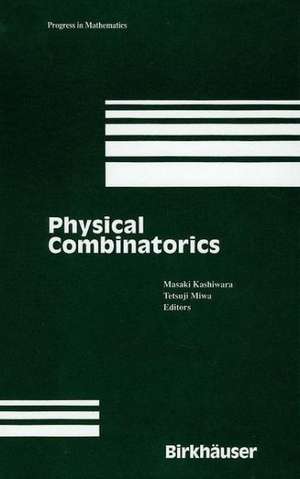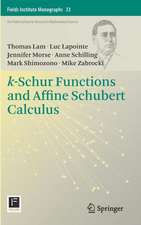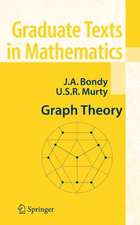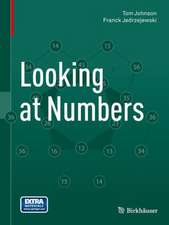Physical Combinatorics: Progress in Mathematics, cartea 191
Editat de Masaki Kashiwara, Tetsuji Miwaen Limba Engleză Paperback – 15 oct 2012
| Toate formatele și edițiile | Preț | Express |
|---|---|---|
| Paperback (1) | 390.25 lei 6-8 săpt. | |
| Birkhäuser Boston – 15 oct 2012 | 390.25 lei 6-8 săpt. | |
| Hardback (1) | 584.25 lei 6-8 săpt. | |
| Birkhauser – 31 mai 2000 | 584.25 lei 6-8 săpt. |
Din seria Progress in Mathematics
- 24%
 Preț: 740.79 lei
Preț: 740.79 lei -
 Preț: 308.20 lei
Preț: 308.20 lei - 20%
 Preț: 695.88 lei
Preț: 695.88 lei -
 Preț: 362.51 lei
Preț: 362.51 lei -
 Preț: 308.13 lei
Preț: 308.13 lei - 18%
 Preț: 749.27 lei
Preț: 749.27 lei - 9%
 Preț: 766.41 lei
Preț: 766.41 lei - 20%
 Preț: 631.08 lei
Preț: 631.08 lei - 24%
 Preț: 638.86 lei
Preț: 638.86 lei - 15%
 Preț: 580.82 lei
Preț: 580.82 lei -
 Preț: 392.37 lei
Preț: 392.37 lei -
 Preț: 395.09 lei
Preț: 395.09 lei -
 Preț: 376.80 lei
Preț: 376.80 lei -
 Preț: 390.25 lei
Preț: 390.25 lei - 18%
 Preț: 729.53 lei
Preț: 729.53 lei - 15%
 Preț: 652.49 lei
Preț: 652.49 lei - 15%
 Preț: 649.22 lei
Preț: 649.22 lei - 18%
 Preț: 897.95 lei
Preț: 897.95 lei -
 Preț: 385.08 lei
Preț: 385.08 lei -
 Preț: 391.02 lei
Preț: 391.02 lei -
 Preț: 378.54 lei
Preț: 378.54 lei - 15%
 Preț: 531.59 lei
Preț: 531.59 lei - 15%
 Preț: 642.83 lei
Preț: 642.83 lei - 15%
 Preț: 650.69 lei
Preț: 650.69 lei -
 Preț: 381.21 lei
Preț: 381.21 lei -
 Preț: 392.37 lei
Preț: 392.37 lei -
 Preț: 398.53 lei
Preț: 398.53 lei - 15%
 Preț: 699.28 lei
Preț: 699.28 lei -
 Preț: 416.92 lei
Preț: 416.92 lei -
 Preț: 385.84 lei
Preț: 385.84 lei - 18%
 Preț: 902.65 lei
Preț: 902.65 lei - 18%
 Preț: 802.28 lei
Preț: 802.28 lei - 15%
 Preț: 640.06 lei
Preț: 640.06 lei - 18%
 Preț: 1129.83 lei
Preț: 1129.83 lei - 15%
 Preț: 494.03 lei
Preț: 494.03 lei - 15%
 Preț: 593.08 lei
Preț: 593.08 lei
Preț: 390.25 lei
Nou
Puncte Express: 585
Preț estimativ în valută:
74.69€ • 77.68$ • 62.59£
74.69€ • 77.68$ • 62.59£
Carte tipărită la comandă
Livrare economică 13-27 martie
Preluare comenzi: 021 569.72.76
Specificații
ISBN-13: 9781461271215
ISBN-10: 1461271215
Pagini: 332
Ilustrații: IX, 317 p.
Dimensiuni: 155 x 235 x 25 mm
Greutate: 0.47 kg
Ediția:Softcover reprint of the original 1st ed. 2000
Editura: Birkhäuser Boston
Colecția Birkhäuser
Seria Progress in Mathematics
Locul publicării:Boston, MA, United States
ISBN-10: 1461271215
Pagini: 332
Ilustrații: IX, 317 p.
Dimensiuni: 155 x 235 x 25 mm
Greutate: 0.47 kg
Ediția:Softcover reprint of the original 1st ed. 2000
Editura: Birkhäuser Boston
Colecția Birkhäuser
Seria Progress in Mathematics
Locul publicării:Boston, MA, United States
Public țintă
ResearchCuprins
An Insertion Scheme for Cn Crystals.- On the Combinatorics of Forrester-Baxter Models.- Combinatorial R Matrices for a Family of Crystals: Cn(1) and A2n-1(2) Cases.- Theta Functions Associated with Affine Root Systems and the Elliptic Ruijsenaars Operators.- A Generalization of the q-Saalschütz Sum and the Burge Transform.- The Bethe Equation at q = 0, the Möbius Inversion Formula, and Weight Multiplicities I: The sl(2) Case.- Hidden E-Type Structures in Dilute A Models.- Canonical Bases of Higher-Level q-Deformed Fock Spaces and Kazhdan-Lusztig Polynomials.- Finite-Gap Difference Operators with Elliptic Coefficients and Their Spectral Curves.
Textul de pe ultima copertă
This work is concerned with combinatorial aspects arising in the theory of exactly solvable models and representation theory. Recent developments in integrable models reveal an unexpected link between representation theory and statistical mechanics through combinatorics. For example, Young tableaux, which describe the basis of irreducible representations, appear in the Bethe Ansatz method in quantum spin chains as labels for the eigenstates for Hamiltonians.
Taking into account the various criss-crossing among mathematical subject, Physical Combinatorics presents new results and exciting ideas from three viewpoints; representation theory, integrable models, and combinatorics.
This volume will be of interest to mathematical physicists and graduate students in the the above-mentioned fields.
Contributors to the volume: T.H. Baker, O. Foda, G. Hatayama, Y. Komori, A. Kuniba, T. Nakanishi, M. Okado, A. Schilling, J. Suzuki, T. Takagi, D. Uglov, O. Warnaar, T.A. Welsh, A. Zabrodin
Taking into account the various criss-crossing among mathematical subject, Physical Combinatorics presents new results and exciting ideas from three viewpoints; representation theory, integrable models, and combinatorics.
This volume will be of interest to mathematical physicists and graduate students in the the above-mentioned fields.
Contributors to the volume: T.H. Baker, O. Foda, G. Hatayama, Y. Komori, A. Kuniba, T. Nakanishi, M. Okado, A. Schilling, J. Suzuki, T. Takagi, D. Uglov, O. Warnaar, T.A. Welsh, A. Zabrodin
Descriere
Descriere de la o altă ediție sau format:
Taking into account the various criss-crossing among mathematical subject, Physical Combinatorics presents new results and exciting ideas from three viewpoints; representation theory, integrable models, and combinatorics. This work is concerned with combinatorial aspects arising in the theory of exactly solvable models and representation theory. Recent developments in integrable models reveal an unexpected link between representation theory and statistical mechanics through combinatorics.
Taking into account the various criss-crossing among mathematical subject, Physical Combinatorics presents new results and exciting ideas from three viewpoints; representation theory, integrable models, and combinatorics. This work is concerned with combinatorial aspects arising in the theory of exactly solvable models and representation theory. Recent developments in integrable models reveal an unexpected link between representation theory and statistical mechanics through combinatorics.

















